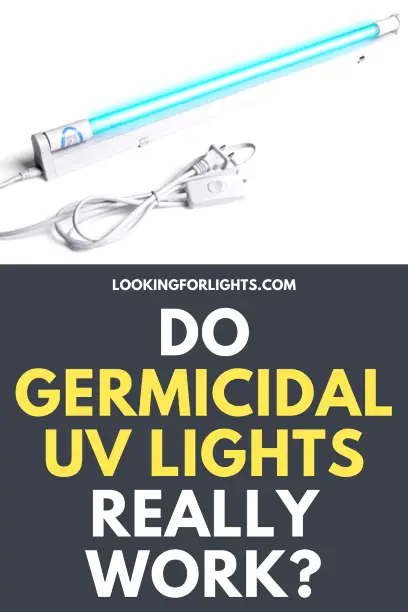
Ultraviolet radiations of the sun are also known to kill bacteria and other microorganisms. On the same principle, Germicidal UV lights are being popularly used in today’s world for multiple purposes like disinfection, sterilization, and sanitation. But do these germicidal UV lights really work? Let’s discuss the working of germicidal UV lights to know if they are really effective or not.
Table of Contents
What Are Germicidal UV Lights?
Germicidal UV lights are the type of UV light that falls in the UV-C region of the spectrum of light. The UV-C region represents the wavelengths between 100 nm and 280 nm. These short wavelengths are known to alter the genetic processes happening inside the cells of the microorganisms. Also, these types of radiations are known to kill 99.9% of germs. Being a non-chemical approach to inhibiting the growth of microorganisms, germicidal UV lights claim huge importance in the food processing, water, and medical industries. Unlike chemical disinfectants, UV-C radiations do not produce a pungent smell.
Do Germicidal UV Lights Really Work?
Yes, the germicidal UV lights are really effective in killing germs and microbes. Germicidal UV-C lights having shorter wavelengths are known to be extremely effective in inhibiting the growth of microorganisms. The UV-C lights attack the nucleic acid of the microorganisms and deactivate their DNA. As a result, microorganisms such as bacteria, fungi, viruses, and other microbes are unable to replicate and cause harmful diseases.
How do Germicidal UV Lights Work?
The germicidal UV lights destroy the genetic material of the cells of the microbes by making covalent bonds with the specific base pairs in the DNA of the microbes. Covalent bonds, being stronger than other kinds of bonds, prevent the DNA from unzipping and hence replication. Therefore, the microbes are unable to reproduce and ultimately die because of the inability to replicate.
Applications of Germicidal UV Lights

There are numerous applications of germicidal UV lights in various fields such as food processing, water treatment, sanitation, disinfection, etc. Some of the main applications of germicidal UV lights are mentioned below.
- Germicidal UV lights are used in upper-room air lamps to prevent the transmission of viruses.
- These lights are used for disinfection in the animal husbandry industry, breweries, dairy processing units, bottling facilities, and food processing plants.
- UV lights find a great deal of importance in water treatment plants, ponds, and lake reclamation processes.
- Germicidal UV lights are also used for disinfection and sanitation in swimming pools, schools, and hotels that are usually the breeding ground for microbes.
- In the medical world, germicidal UV lights are extremely important for sanitation and disinfection in hospitals, laboratories, maternity areas, pathology labs, and kidney dialysis units.
- Germicidal UV lights are an irreplaceable way of destroying bacteria and pathogens. It is because the bacteria and other pathogens cannot become immune to the UVC light as they would to antibiotics and antibacterial things.
- These lights are good for disinfecting areas occupied by humans. It is because, unlike chemical disinfectants, UVC light doesn’t produce odor.
Can UV Light Kill Covid-19 Virus?
UVC light can be effective in destroying the outer protein coating of coronavirus, hence deactivating the virus. But there is no concrete data that indicates the effectiveness of UVC light in killing the Covid-19 virus. Also, the effectiveness of UVC light in inactivating the Covid-19 virus has certain limitations.
For example, only the direct exposure of UVC light to the virus can deactivate the virus. So the virus present on the outdoor surfaces may not be made inactive by exposure to UVC light as there is a layer of soil and dust on the surface. In addition to this, the dose and duration of UVC exposure is an important factor to consider while measuring the effectiveness of UVC light in inactivating the Covid-19 virus.
Can You Use UV Lamps For Disinfection At Home?
No, it’s not safe to use UV-C lamps at home for disinfection purposes. It is because direct exposure of UVC light to the skin and eyes can cause painful injuries in the eyes and a burning sensation on the skin. UVC lamps may also release ozone gas, which when inhaled is likely to cause problems in the airway of the human body. While using UVC lamps at home, some materials like plastic, polymers and dyed textiles can suffer through degradation. UVC lamps, when broken, need extreme care in terms of disposal because they contain mercury.
Lamps That Produce Germicidal UV Light
Low-Pressure Mercury Lamps
Low-pressure mercury lamps are the kind of lamps that produce UV radiations with the main emission at 254 nm. Such lamps are capable of other types of wavelengths in the visible and infrared region.
Pulsed Xenon Lamps
Pulsed Xenon Lamps emit a broad spectrum of light in the visible, UV, and infrared regions. This spectrum of light is then filtered to obtain UVC radiations. These lamps are commonly used in hospitals to disinfect surfaces in operation theatres and other areas. The lamps are used when there are no human beings present in the surroundings.
Light-Emitting Diodes (LED)
UV Light-emitting diodes or UV LEDs are largely gaining popularity because unlike mercury lamps, they don’t contain mercury which is harmful to human health. These types of LEDs produce a very narrow spectrum of wavelengths. But the beam feature of LED light and small surface area makes them unsuitable for germicidal purposes.
How to Verify the Effectiveness of Germicidal UV Lights?
There are a number of devices like radiometers that prove the effectiveness of UVC radiations in the disinfection of surfaces. But these devices are extremely expensive. To check the effectiveness of UVC radiations in killing pathogens, a device known as a dosimeter is a great one to use. It has a color-changing ink that is sensitive to UVC radiations. These single-use dosimeters tell you about the appropriate time required to disinfect a surface. Dosimeters work well with 254 nm wavelength sources of light. But they do not provide accurate information when used with the lights of the far UVC region, pulsed xenon lamps, and UV LEDs.

